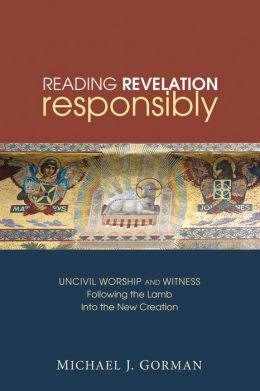Gorman, Michael J. Reading
Revelation Responsibly: Uncivil Worship and Witness: Following the Lamb into
the New Creation. Cascade Books, an imprint of Wipf and Stock Publishers, 2011.
Since I am taking a class on the book of Revelation this
summer, I have to read a host of books on the Apocalypse. I am not too deep into my reading, but for a
monthly book review, I wanted to mention the last book I just finished. It was very good, very practical, and very insightful. Gorman's Reading Revelation Responsibly
gives an outstanding approach to Revelation.
Here is a basic overview.
Gorman is primarily arguing from the idealist interpretation of
Revelation. Although he does see certain
visions pointing back to the Roman empire, by and large the book is timeless
(and missional). The more I read, the
more I see a prevailing view in modern interpretation of Revelation that says it
is not so much an encouragement for those being persecuted as it is a warning or
prompt to non-conformity to the empirical cult of the day. It is a work of apocalyptic to encourage
believers of Jesus, the slaughtered Lamb, to be anti-assimilation from the
empire. Gorman treats that very
practically for American evangelicals who have pretty much divinized patriotism
and turned it into a civil religion itself.
Thus, the way he reads Revelation has a great relevance for the American
Christian church for today, who have as much if not more loyalty to a nation
and its cultic-civil practices as for loyalty to the Lamb. If we were honest, this is indeed the situation
in many churches in USA (just observe many services on or around the 4th
of July in the Bible belt).
Gorman also sees Revelation to be very missional, which I
appreciate. Since the community of
Christ is a multi-ethnic and global community, patriotism to one nation makes
little sense, especially since we are part of God's empire/kingdom and no
longer citizens of this world (Phil. 3:20-21).
What I appreciate is that his view of empire and the call
for believers to come out of the worship of that empire (for example: Christian's
swearing fidelity to even the flag of a nation). No matter the goodness or badness of the
empire, conformity should be to the suffering Lamb not to the conquering
nation. Perhaps his greatest insight is
how the mission is accomplished through non-violent action. In other words, Jesus conquers not with the
sword in his hand but the sword in his mouth (through his word). He wins by dying. The lion king overcomes by being the
slaughtered lamb. And the mission of the
church is to overcome injustice in the same way. We don't take up the sword ("for God and
country") to win the day. We stand apart
from the empire with dying to self, bearing our own cross, and suffering for
the sake of Jesus. It is when we are
comfortable in the empire we live in that is the true danger for the churches
to repent of.
Perhaps a major flaw is that his politics do seem to creep
in to his critique of what an (bad?) empire is, America being the prime
example. It seems that the capitalistic
and nationalistic society of America has encouraged the empire of America which
leads to injustice on all levels and social categories. Whether he is correct in that assessment is
not for me to decide here. But there is
a negativity towards those systems, something I am not altogether comfortable
with. Every political agenda is flawed
(communist, socialist, or capitalist) because it is a system of sinful humans.
Lastly, Gorman is very critical of the dispensational,
futurist view. He critiques it repeatedly
throughout the book (most especially the Left Behind series). Let me say that I
am in full agreement with his critique.
However, knowing the fundamentalist, dispensational mindset very well,
many who would normally give Gorman a fair hearing will completely turn him off
with the over-critical nature in his presentation. Has the futurist view terribly distorted the
meaning of Revelation and thus the political practices of many in the
church??? YES! But I wonder if his constant barrage of the futurist
view is helpful to win the argument.
However, I feel confident that his concern was not to win an argument,
so I may be offering a moot point.
In all, this brief presentation of a responsible way to read
Revelation gets 2 thumbs up from me. It
is a simple and short book for all sorts of readers (student to scholar). It is presented well and full of practical
insights that make it tremendously valuable in seeing Revelation as a vital
part of the churches devotional, spiritual, missional, worshipful life.


No comments:
Post a Comment